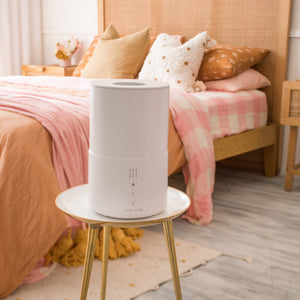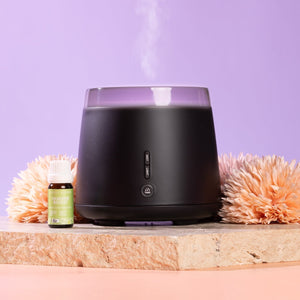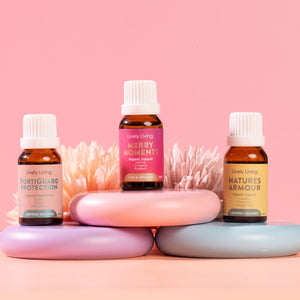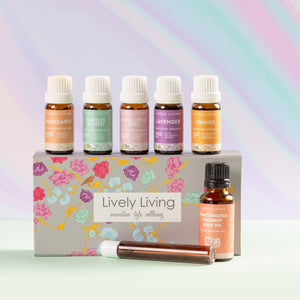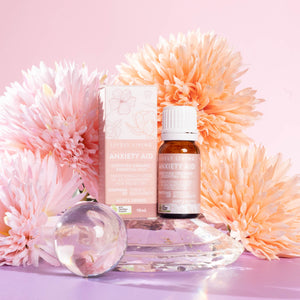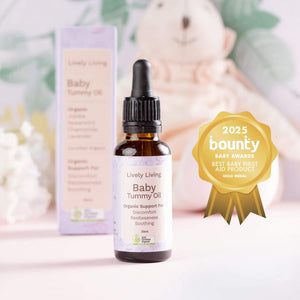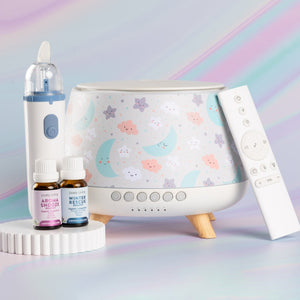Essential Oils for Babies: Safe Choices for Better Sleep
As parents, we want the absolute best for our little ones, especially regarding their well-being and development. This often includes exploring natural remedies and therapies, such as essential oils for babies. While the idea of incorporating essential oils into a baby’s routine might seem appealing, it also raises many questions and concerns. Let’s learn more about essential oils for babies and how they can play a role in your baby's routine.
Table Of Contents:
Understanding Essential Oils for Babies
Essential oils are concentrated plant extracts known for their potent aromas and therapeutic properties. However, it’s crucial to remember that babies are far more sensitive to essential oils than adults. Their delicate skin and developing respiratory systems require extra caution.
It's not just about using essential oils safe for babies but also about diluting them properly, choosing safe application methods, and being mindful of potential risks. To help make bath time easier and more enjoyable for both you and your little one, consider oil blends designed for babies.
Are Essential Oils Safe for Babies?
The use of essential oils for babies is a subject of ongoing debate. While some studies show that certain essential oils offer potential benefits, research in this area, particularly for infants, remains limited. Many healthcare professionals advise against using essential oils on babies under three months old.
This is because a baby’s skin is thinner and more porous than an adult’s. They absorb essential oils more easily, increasing the risk of irritation or allergic reactions. If you are considering using essential oils for babies older than three months, only use pure certified organic essential oils like the Baby and Child range from Lively Living. This will help determine if they're right for your little one and what precautions you should take.
Benefits of Certain Essential Oils for Babies
Though caution is paramount, some essential oils have a history of being used to ease specific discomforts in babies when used appropriately. Essential oil safety is crucial, and certain oils like chamomile essential oil are believed to promote restful sleep.
| Essential Oil | Potential Benefit | Cautions |
|---|---|---|
| Lavender oil | Promotes relaxation and sleep | Use in moderation, diluted properly. May cause skin irritation in some babies. |
| Roman chamomile oil | Soothes colic and digestive discomfort | May cause allergic reactions in babies allergic to ragweed or daisies. |
| Spearmint | May help with gas and indigestion | Dilute before use. Monitor for skin sensitivity. |
Choosing and Using Essential Oils for Your Baby
If you decide to use essential oils for babies after consulting your doctor, opt for high-quality, pure essential oils from reputable brands. Ensure they’re 100% natural and free of synthetic fragrances, additives, or chemicals. Always dilute essential oils for babies before use.
The general rule of thumb is to use one drop of essential oil for every one tablespoon of carrier oil, such as coconut oil, sweet almond oil, or jojoba oil if applying to the skin. This is key to ensuring that the essential oil is sufficiently diluted and safe for your baby's skin. Use one to two drops diluted in the water well of a 300ml diffuser or humidifier to ensure ample dilutution if diffusing in the nursery.
Safe Application Methods
For babies, the safest way to use essential oils is through diffusion or topical application.
Diffusion
Adding a few drops of a diluted essential oil blend to a diffuser can help create a calming atmosphere in your baby's room. This can be particularly helpful as part of a bedtime routine, promoting a soothing atmosphere that may help your baby fall asleep easier. However, it’s essential to avoid diffusing for extended periods and ensure the room is well-ventilated.
Topical Application
You can use diluted essential oil blends topically. Gentle massage on their feet is often recommended. You can also incorporate this into your baby massage routine. Before applying, perform a patch test on a small area of your baby's skin to check for any adverse reactions.
Essential Oils to Avoid for Babies
Some essential oils are not safe for babies and should be avoided completely. These oils can be harmful to babies and young children. These include:
- Camphor
- Peppermint - (use the much gentler Spearmint instead)
- Wintergreen
These oils can cause respiratory problems, skin irritation, or other adverse reactions in babies.
Natural Solutions to Support your Child
For parents who prefer to err on the side of caution or are looking for alternatives, there are plenty of safe and effective ways to soothe and care for their babies. These include:
- Baby massage: Gentle massage with a safe baby balm or oil. These can work wonders for relaxation and bonding.
- Warm baths: A warm bath can calm a fussy baby and promote sleep. Adding a few drops of lavender oil to the bathwater can create a calming experience.
- White noise: The gentle hum of a white noise machine can be soothing. You can find a variety of white noise machines at Lively Livings Aroma-Snooze Collection
- Swaddling: Swaddling helps babies feel secure and can prevent the startle reflex from disturbing their sleep.
FAQs About Essential Oils for Babies
How do I dilute essential oils for my baby?
The general rule for babies older than three months is one drop of essential oil in one tablespoon of carrier oil, or 1-2 drops in a 300ml capacity humdifier. Always perform a patch test on a small area of your baby's skin before applying more extensively.
What carrier oils are safe for babies?
Commonly recommended carrier oils include coconut, sweet almond, and jojoba oil. It is crucial to choose high-quality, organic, cold-pressed oils.
Can I diffuse essential oils in my baby's room while they're sleeping?
Yes. Use a cool mist diffuser. Add just one to two drops diluted in the water well, of an average 300ml capacity. Diffuse in a well-ventilated room.
Conclusion
Learning about essential oils for babies might feel overwhelming at first, but it doesn't have to be. Always put your baby's safety first and prioritize open communication with your pediatrician. With the right knowledge, you can make informed decisions about how to incorporate essential oils safely into your family's wellness routine.













